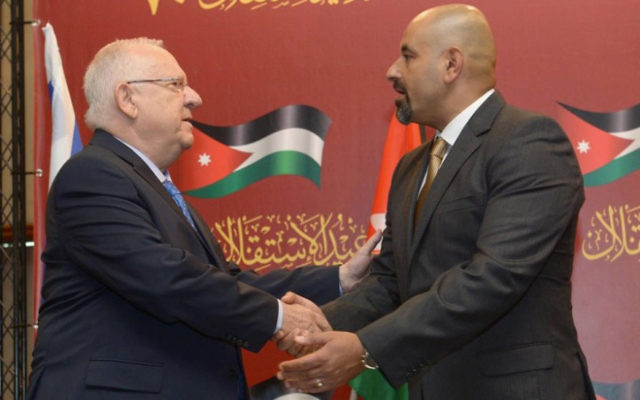Celebrating Jordan’s 70th anniversary
Israel’s neighbour marked its 70th birthday last week, and as Jordan celebrated, Israel’s president joined the party.
Israel’s neighbour marked its 70th birthday last week, and as Jordan celebrated, Israel’s president joined the party.
Reuven Rivlin even waxed lyrical about the country in Arabic during an Independence Day reception at Amman’s embassy in Tel Aviv. “I wish Jordan prosperity,” he said in Arabic after congratulating the state and its citizens. “Friends, Jordan is a great and important state in our region.”
He went further, continuing in English and saying, “Jordan has long been a unique example of a strong state, and a moderate state. Your moderation does not come from weakness, it is a sign of your strength. Israel is proud to be Jordan’s partner and to stand at Jordan’s side, in promoting stability and quiet to our entire region.”
It was quite a speech for the Independence Day of a country that bitterly fought Israel upon its own independence and in the years that followed, and a country that as recently as April strongly criticised Israel for allowing its citizens to visit Temple Mount and warned that this could have “serious consequences”.
But despite occasional wars of words over Jerusalem – especially on the Temple Mount ,which is under Israeli rule but under day-to-day control of a Jordanian Islamic trust – relations between Jerusalem and Amman are strong. Neither country has looked back from the 1994 peace treaty that they signed.
The peace agreement is strong, serves the strategic interests of both countries, and the economic benefits are also significant. Israel has signed a major agreement to supply natural gas to Jordan, and its pipeline is due to start operating next year. In the realm of water, the new “Red-Dead” project approved in December will increase the capability of Jordan to desalinate water, which will in turn sell 35 million cubic metres to Israel.
There are all sorts of ties that can only exist smoothly between neighbours living at peace. For example, 1500 Jordanian workers recently received permission to work at Eilat hotels, and the Israeli government is working on a similar agreement to get Jordanians working at Israeli-run Dead Sea resorts.
But what propelled Israel’s President to display so much enthusiasm towards Jordan, and even to start talking Arabic in honour of the country’s birthday? The Israeli focus on Jordan is particularly strong at the moment as a result of two factors – one of them an opportunity and one a danger.
Jordan’s prime minister Abdullah Ensour resigned in May and the country is headed to elections. King Abdullah has appointed a caretaker Prime Minister, Hani Mulqi, a veteran politician who was heavily involved in putting together the Israeli-Jordanian peace agreement. Analysts in Jordan are suggesting that managing ties with Israel will be among his highest priorities, and that he is keen to build the relationship and possibly to oversee a push towards Israeli-Palestinian peace negotiations.
Mulqi is expected to be a leading contender in the prime ministerial election, which will happen with four months.
The threat that is bringing Jordan and Israel closer is terror. Jordan is increasingly worried by the Muslim Brotherhood, the Islamist movement that is closely related to Hamas, and is fighting harder than ever to stamp it out. And Jordan is alarmed by the rampage of ISIS next door, in Iraq. It fears a move by ISIS to establish itself and possibly take territory within Jordan.
This scenario, ISIS inroads into Jordan, would be a nightmare for Israel, and could potentially place the bloodthirsty militants of this extremist Islamist group in parts of Israel’s longest border. Israel and Jordan’s interests coincide, and this will continue to push them closer.
NATHAN JEFFAY


comments